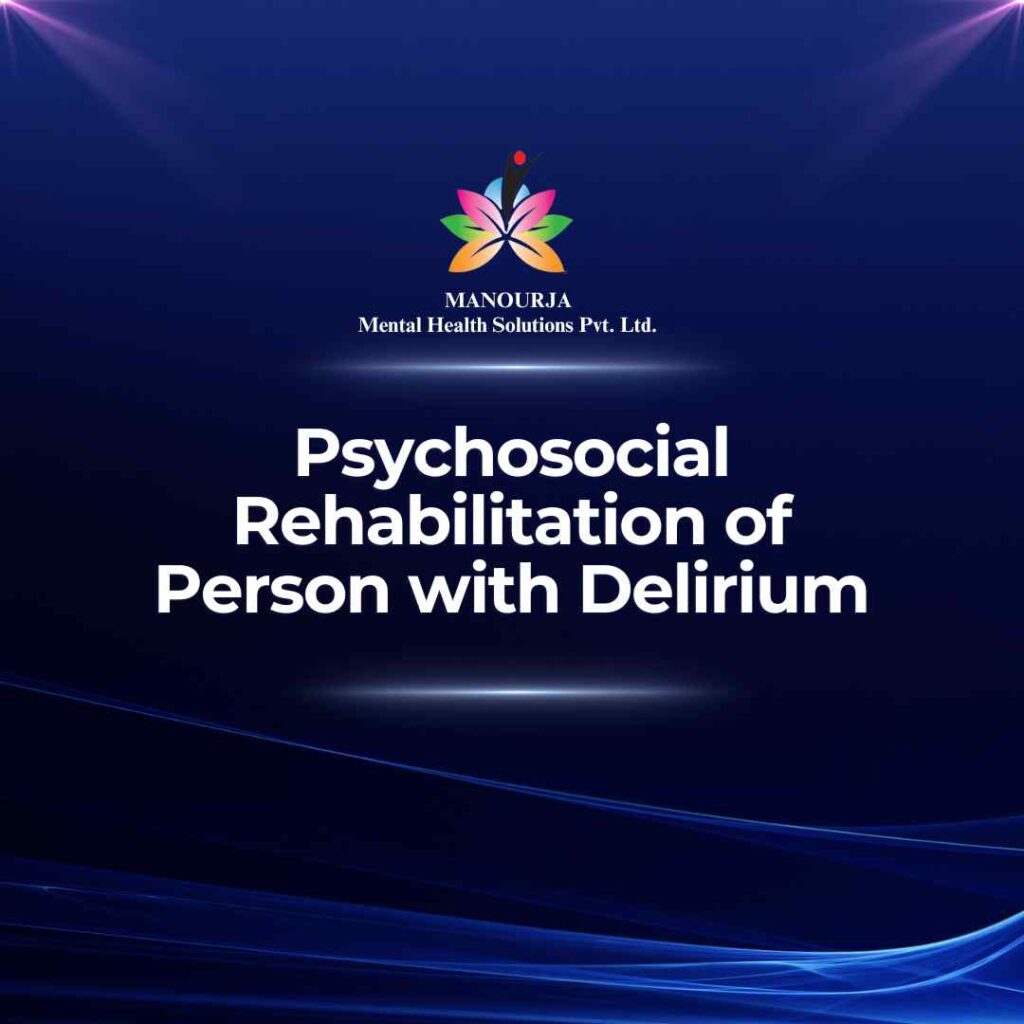Psychosocial Rehabilitation of person with Delirium

Psychosocial rehabilitation for a person with delirium involves a holistic approach aimed at addressing the individual’s psychological, social, and environmental needs to promote recovery and improve functioning.
Here are some key components of psychosocial rehabilitation for delirium
- Assessment and Goal Setting: Psychosocial rehabilitation begins with a comprehensive assessment of the individual’s strengths, needs, and preferences. This assessment helps identify specific goals for rehabilitation, such as improving cognitive functioning, enhancing social skills, or increasing independence in daily activities.
- Education and Psychoeducation: Providing education about delirium and its symptoms is essential for both the individual and their caregivers. Psychoeducation helps increase understanding of the condition, promotes engagement in treatment, and empowers individuals and their families to participate actively in the recovery process.
- Cognitive Rehabilitation: Cognitive rehabilitation techniques can help individuals with delirium regain and improve cognitive abilities that may have been affected by the condition. This may include cognitive exercises, memory training, attention-building activities, and strategies to improve problem-solving and decision-making skills.
- Environmental Modifications: Creating a supportive and structured environment can help minimize confusion and agitation in individuals with delirium. This may involve reducing sensory overload, providing familiar and comforting objects, maintaining consistent routines, and ensuring adequate lighting and safety measures.
- Social Support and Integration: Social support networks play a crucial role in the recovery process for individuals with delirium. Psychosocial rehabilitation may involve connecting individuals with supportive family members, friends, or support groups, as well as facilitating social activities and participation in community events.
- Emotional Support and Counseling: Addressing emotional needs and providing counseling or therapy can help individuals cope with the emotional impact of delirium and any underlying stressors or traumas. Therapeutic approaches such as cognitive-behavioral therapy (CBT), supportive therapy, or mindfulness-based interventions may be beneficial.
- Functional Skills Training: Rehabilitation may focus on improving the individual’s ability to perform activities of daily living (ADLs) and instrumental activities of daily living (IADLs), such as grooming, cooking, managing medications, and using transportation. Skills training and adaptive techniques can help individuals regain independence and confidence in these areas.
- Medication Management and Monitoring: Psychosocial rehabilitation includes monitoring medication adherence, managing side effects, and coordinating with healthcare providers to ensure optimal pharmacological treatment for delirium and any underlying medical conditions.
- Continuity of Care and Follow-up: Psychosocial rehabilitation should be an ongoing process with regular monitoring and follow-up to assess progress, address any setbacks or challenges, and adjust interventions as needed. Continuity of care ensures that individuals receive consistent support and assistance throughout their recovery journey.
By addressing the psychological, social, and environmental aspects of recovery, psychosocial rehabilitation can help individuals with delirium achieve meaningful improvements in their quality of life, functioning, and overall well-being.
At MANOURJA, we believe in the transformative power of counseling. Our experienced therapists offer a safe and supportive space where you can explore your thoughts, emotions, and challenges. Through personalized counselling sessions, we’ll work together to develop coping strategies, build resilience, and achieve lasting positive change. Discover the path to a healthier, happier you with MANOURJA counselling services.
MANOURJA Rehabilitation Services
At MANOURJA, we’re dedicated to helping you in rebuild your life, after difficult times. Our rehabilitation services focus on understanding what you need to move forward, whether you’re recovering from addiction, trauma, or any psychological – social challenges. We create personalized plans, that are all about helping you, regain your strength and find hope again. With a caring team by your side, you’ll have the support to make real progress and take steps toward a brighter, healthier future.
